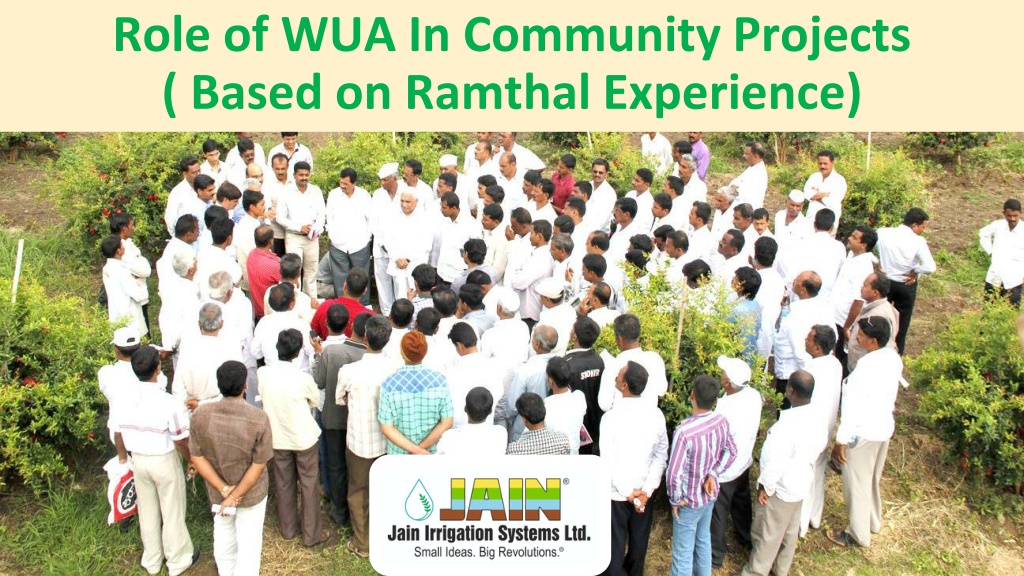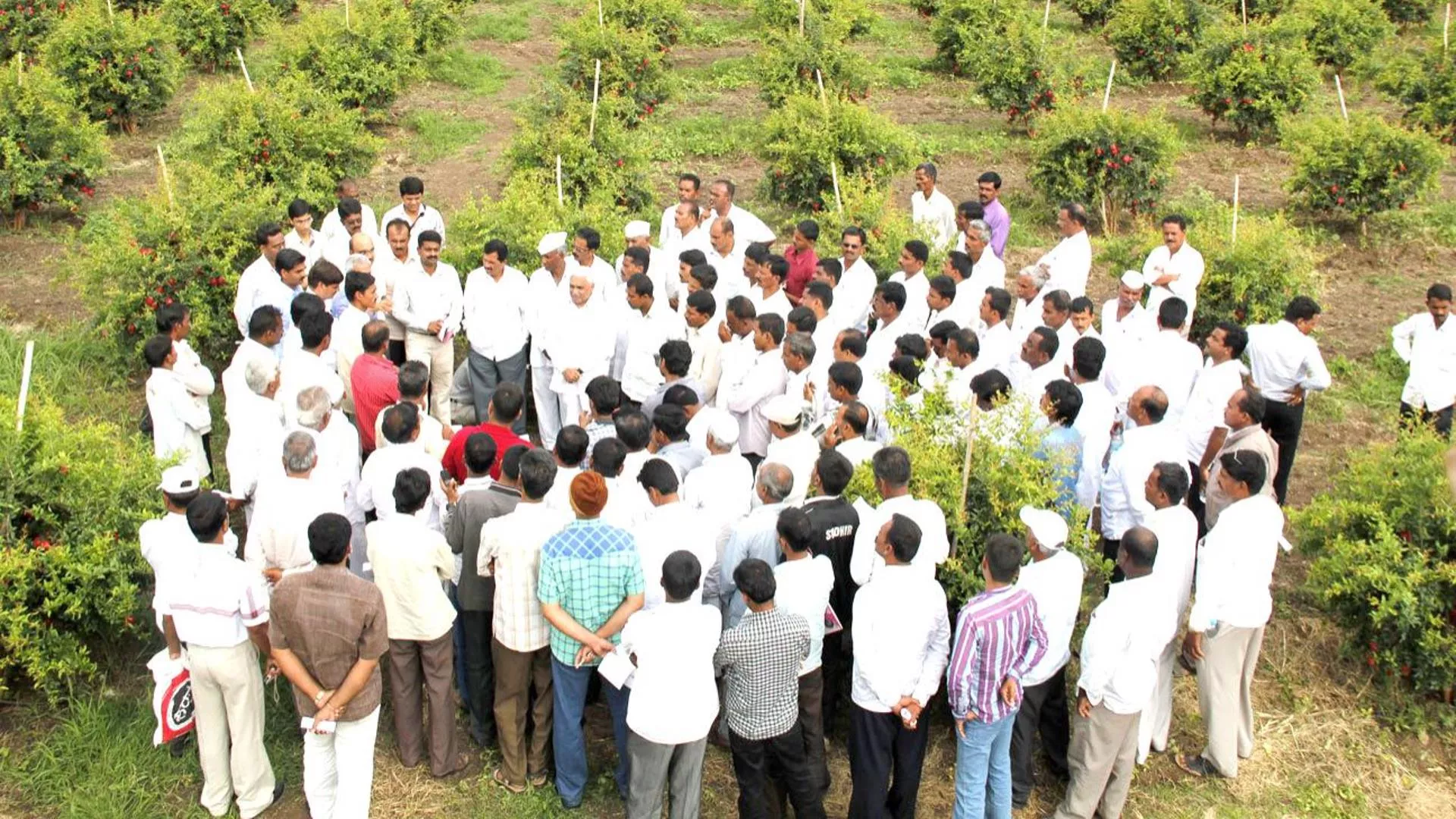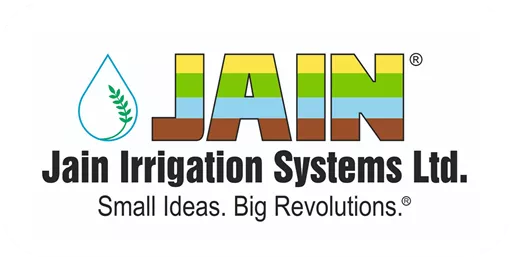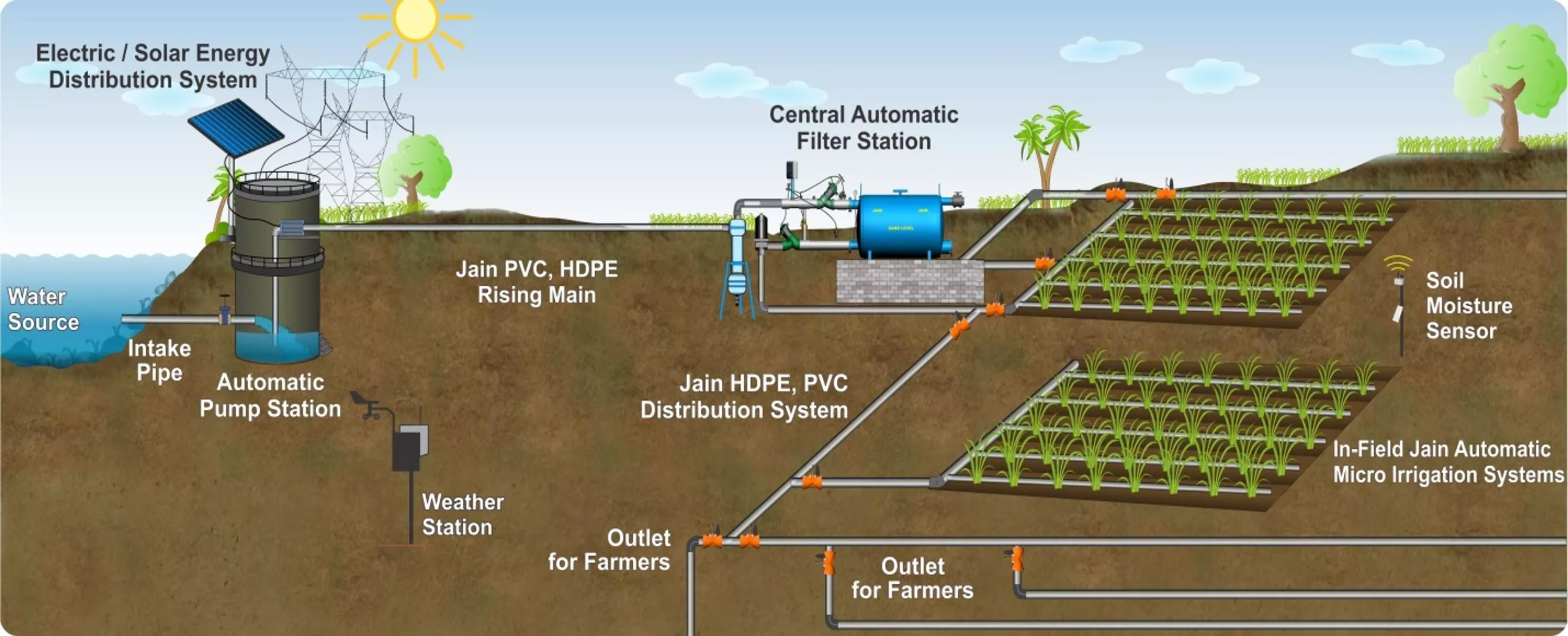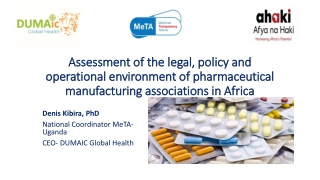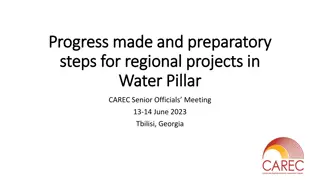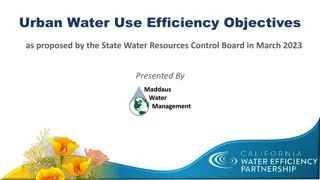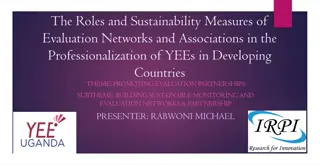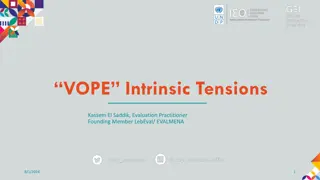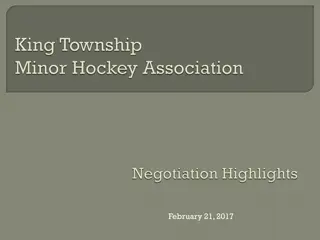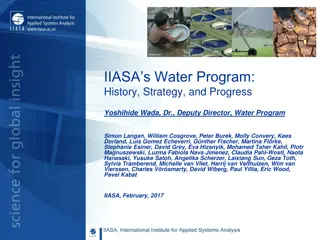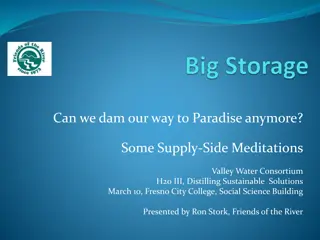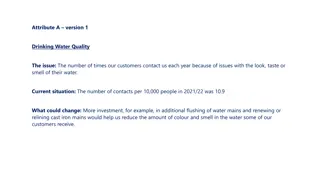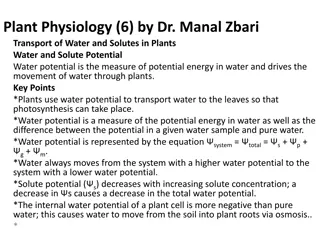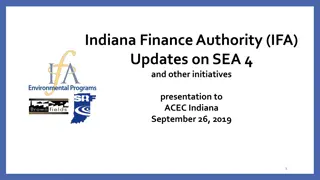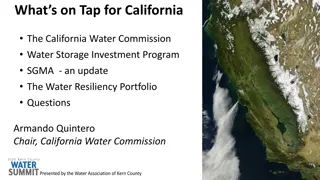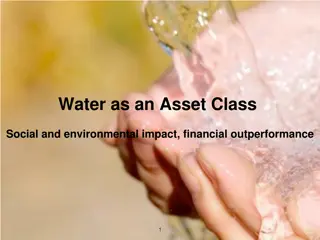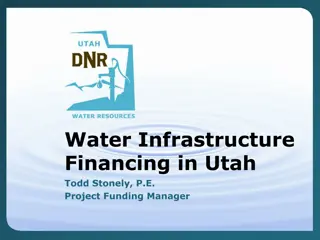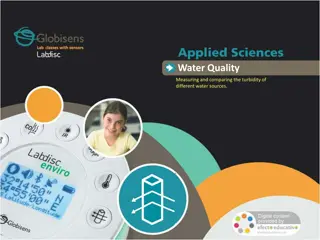Enhancing Community Projects Through Water User Associations (WUA) in Ramthal Experience
The role of Water User Associations (WUAs) in community projects, such as irrigation schemes, plays a vital role in improving service delivery, ensuring reliable water supply, reducing losses, and enhancing productivity. By implementing Public-Private Partnerships (PPP) in irrigation, better results can be achieved with increased efficiency, higher incomes for farmers, and sustainable project outcomes. The key components of successful schemes include modern irrigation methods, integrated micro-irrigation projects, and 80% irrigation efficiencies. Private partners take on major responsibilities in project design, implementation, and operation, with the ultimate goal of benefiting both the community and the private sector.
- Community Projects
- Water User Associations
- Irrigation Schemes
- Public-Private Partnerships
- Sustainable Development
Download Presentation

Please find below an Image/Link to download the presentation.
The content on the website is provided AS IS for your information and personal use only. It may not be sold, licensed, or shared on other websites without obtaining consent from the author. Download presentation by click this link. If you encounter any issues during the download, it is possible that the publisher has removed the file from their server.
E N D
Presentation Transcript
Role of WUA In Community Projects ( Based on Ramthal Experience)
Why PPP in Irrigation Better Service Delivery and Reliable Water Supply Reduced Water Losses Increased Water, Power and Fertilizer Application Efficiencies Increased Productivity Increased Farmers Income Better Recoveries Performance Based Engagement of PP Sustainable Projects
Basic Requirements Irrigation schemes are supply-based. These practice needs to be changed, We have to adapt modern & efficient irrigation methods, which will ensure higher productivity, These projects will have to be designed as an integrated micro irrigation projects, where design is based on daily irrigation/on demand irrigation The objectives of the scheme should be increasing water productivity, value creation and not merely water distribution. The projects should be designed with 80 % + irrigation efficiencies. Every scheme should be designed keeping in mind, the existing crop + crop rotation. Adequate quantities of water should be made available as per the daily crop water requirements of crops. If the water source is canal water, scheduling will have to be changed to daily supply. Water storages if required will have to be created in order to have uninterrupted water supply as per crop demand. Availability of reliable power supply should be ensured. Irrigation projects are many times abandoned because of non-payment of electricity bills. Solar Pumping Systems should be encouraged. Hand Holding and Training ( at least 3-5 Years) should be integral part of the project
Major Responsibilities of Private Partner a. Preliminary investigation, contour survey, design, prepare development plan and agri-business plan and take approval of the Government to execute the plan in time bound manner. b. Mobilization of required Money, Manpower and Machinery and will develop the project as per the agreement with Government. They will have enough freedom to do necessary changes in the designs/plans if required. c. Design, Build, Operate and then Transfer the irrigation systems to the Water User Association after the agreement period is over. d. Request Govt. to pay them each year cost of operation and maintenance charges on per ha basis e. Will not claim ownership of any assets created at the farm after the agreement period is over f. Ownership of the irrigation systems, machinery, buildings, etc will remain with WUA, However private partner will enjoy the benefits/use during the concession agreement. They will also work as Trusties/ Custodian of the assets of the systems during concession period. g. All the benefits from proposed agri-businesses such as agri-tourism, aquaculture, TC lab, Nursery, Demonstration units etc will go to the private partner during the concession period. Farm income will go to the respective farmers.
Major Responsibilities of Government a. To hand over all the farms with all the encumbrance free documents to the private partner as soon as concession agreement is signed. b. To pay ------------- of the contract value to the private partner against the delivery of the material at site. c. Government should also pay balance ------------- along with interest in installments and the cost of O and M every year for next 5 years on commissioning of the project d. Government should provide necessary notices/ permissions/acquisitions regarding availability of water and its allocation, water lifting permissions, road crossing, river crossing, nalla crossing, railway crossing, etc. e. Government should operate as evaluation and monitoring agency and will keep all the necessary control over the quality of the development jobs at the farm. f. Government should ensure to take over of all the assets by WUA immediately after the agreement period is over
Major Responsibilities of WUA a. To conduct farming operations such as on-farm irrigation, day to day operation of the systems, crop cultivation, Intercultural operations, irrigation, fertigation, plant protection activities, harvesting etc b. To formulate Water User Association and take part in all the awareness/training programs and capacity building programs arranged by the private partner and or government. c. To pay necessary water and electricity charges to the concerned authorities in time d. Not to claim any crop compensation /damages towards crop loss etc.to the private partner. e. To provide right of way from/to his farm to the private partner during concession period. f. Water User Association to take over all the assets immediately after the agreement period is over g. To Cooperate with each other in equitable distribution of water h. To Conduct elections in time and follow rules and bylaws of the WUA.
Operation and Maintenance O & M of Headworks: Jointly By PP & WUA After the construction/ commissioning of the project, the O&M of Head Works (Pumping Machinery, Filtration, main lines) should be done jointly by the Private Partner & WUA. Role should be clearly defined. Operation should be limited to on/off of the pumping unit & central system main valves opening and closing as per the agreed schedule. Period for such O and M should not be more than 5 years. PP can t be held responsible for provision of water and/ or yields etc.. as they are beyond his control. O & M of On-Farm Irrigation System : Farmers O&M for drip irrigation in farms will be carried out by farmers. The on-farm systems operations such as valve Opening and closing, lateral laying, daily irrigation, flushing of system, fertigation etc.. to be carried out by the farmers themselves The farmers training and capacity building to be done by the contractor. Farmers to participate actively. During O&M, Electricity Charges and Water Charges to be borne by the government.
Service Delivery and Cost - Recovery Type of service delivery: Only On- Demand Irrigation Approach should be adopted. No supply-based systems to be encouraged After O & M period, WUA to decide Water charges to be levied based on Volumes consumed. Differential tariff for Water Charges based on the crops, system and area to be irrigated may be adopted Automatic Water meters may be introduced for better recoveries
Risks Private Partner Government 1. Availability of Perennial Water and Power. PP should not be held responsible for non availability of bulk water and power supply. 1. Handing over the encumbrance free land 2. Investment of CAPEX. Government should provide necessary guarantees for the payments/investments done by PP. 2. Non-payment of water/electricity charges 3. Deployment of manpower and associated Risks. 3. Natural Calamities such as drought, Flood, Earth quake etc
Key Performance Indicators ( KPI) Increased Irrigated Area ( % OR Ha) Increased Crop Productivity ( Kg/ ha) Increased Water Productivity ( Kg/ m3)
